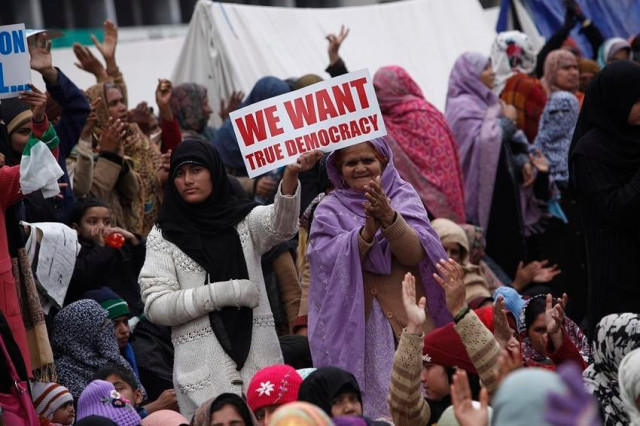Democracy: Uzbekistan wants to learn from Pakistan
Envoy says both countries have come closer to each other in recent years

Supporters of Sufi cleric and leader of the Minhaj-ul-Quran religious organisation Muhammad Tahirul Qadri hold placards during a protest in Islamabad January 17, 2013. PHOTO: REUTERS
This was disclosed by Uzbekistan Ambassador’s Furqat Sidikov as he hosted on Sunday a reception for a delegation of Pakistanis who will be observing the elections in the central Asian country later this month. The delegation comprises lawmakers from the upper and lower houses of parliament, academics, media personnel and members from think tanks. They are expected to travel to Uzbekistan to observe the upcoming parliamentary and local government elections there scheduled for December 22.
During their week-long trip, the delegation will visit various polling stations in Uzbekistan. They will also hold one-on-one meetings with senior government officials. The ambassador also briefed delegation members about the various dimensions and dynamics of Uzbek elections.
Ambassador Sidikov said that they wanted to learn from Pakistan’s experiences of going through elections. Explaining the reason behind that, the envoy said that Uzbekistan considers Pakistan to be one of the biggest democracies in the region, more so amongst the Muslim world.
He added that this resolve was part of Tashkent’s desire to build friendly and brotherly ties with Islamabad.
Sidikov reiterated that his country highly values its relations with Pakistan, recalling that both countries have come closer to each other during the past recent years.
He added that they have also extended a formal invitation to Prime Minister Imran Khan to visit Uzbekistan to help to boost bilateral ties between the two brotherly countries.
The envoy also hinted that a visit of the Uzbek leadership to Pakistan was also on the cards.
Briefing delegation members about elections in his country, Sidikov said the last general elections were held in 2014. This time, he said, as many as five, registered political parties were taking part in the elections.
Another interesting dynamic in the elections was that some two million, newly-inducted young voters will partake in the polls along with 20 million registered voters and that they could play a vital role in electing the next leadership of the country.
Uzbek nationals living in Pakistan will be able to cast their votes at the embassy, he said. The ambassador added that they have set up an election monitoring cell at the embassy in Islamabad.
He further said that if a voter fails to reach Islamabad on the election day, the ballot box will be taken to their doorstep irrespective of how far they were from the embassy.
Dilating on the exact election process, Sidikov said that elections for the Oliy Majlis (Supreme Assembly) were held on the first Sunday of the third decade of December per the Uzbek constitution — this translates to December 22.
The parties participating in this year’s elections include the National Revival Party, the People’s Democratic Party, the Liberal Democratic Party of Uzbekistan, the Social Democratic Party Adolat and the Ecological Party. They will compete for 150 seats in the Legislative Chamber of the Oliy Majlis (the lower house of the parliament). Over 700 candidates are contesting elections for these seats.
Elections for regional, city and district councils will all be held on the same day. The senate, though, will be formed after the elections for the legislative chamber.
Talking about the steps taken for women empowerment, he said that each party had fixed 30% quota for women in the upcoming elections. He added that this would result in a sizeable number of women lawmakers in the parliament to be formed.
The envoy said that the incumbent government, led by President Shavkat Mirziyoyev, has taken several democratic reforms recently.
He further added that the new parliament is expected to pursue the reforms’ agenda of the president, including the provision of better facilities for the masses.
Answering a question, the ambassador said that it was mandatory for every citizen to cast their vote according to the country’s law. He declared it a major reason behind high turnout in the elections that remained close to 95%.
Replying to a question about the educational qualification of the candidates, Sidikov said that the literacy rate in Uzbekistan was very high and almost all the candidates were highly educated while voters were aware of who to vote for.
The envoy highlighted that during the upcoming elections, a large number of businessmen will also take part. He added that it could prove to be very beneficial for the development for the country as such candidates’ possessed reasonable knowledge of the economy and could contribute significantly.
Published in The Express Tribune, December 16th, 2019.



















COMMENTS
Comments are moderated and generally will be posted if they are on-topic and not abusive.
For more information, please see our Comments FAQ